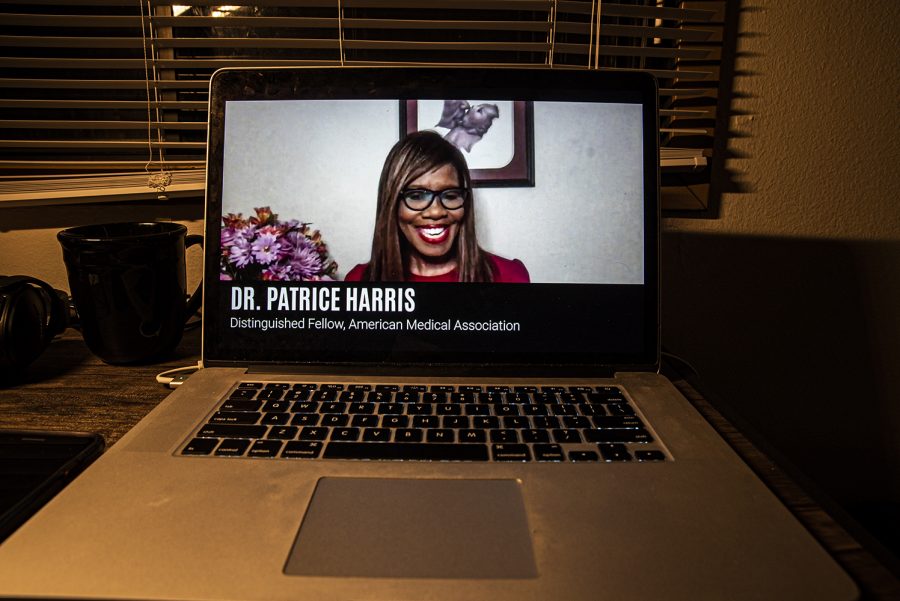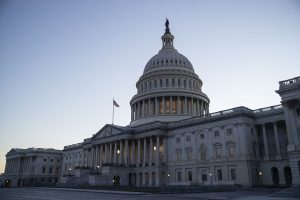First African American woman to lead the American Medical Association speaks to University of Iowa students, staff on racial health disparities
In partnership with the Carver College of Medicine AMA Chapter, the University of Iowa’s Lecture Committee hosted Patrice Harris as their fifth lecturer of the fall semester.
Doctor, Patrice A. Harris gives a lecture over zoom on Monday, November 9th, 2020. Dr.Harris is a guest lecturer invited by the University of Iowa medical community to discuss the issue of health inequity.
November 10, 2020
American Medical Association Immediate Past President Patrice Harris spoke to University of Iowa students and faculty Monday evening about a weighty topic: racial health disparities in the United States health care system.
Harris has experience working in a variety of positions for the American Medicine Association and years of additional advocacy in other national health organizations.
The University of Iowa Lecture Committee partnered with the UI Carver College of Medicine’s American Medical Association chapter to bring Harris, who is the first African American woman to hold the president position, to the university as a virtual lecturer on Monday.
“We have to understand that these are not new issues,” Harris said. “We have long-standing health inequities in our country.”
Black Americans, on average, have a six-year shorter life expectancy than white Americans, and are less likely to receive a wide range of medical services.
The forum was moderated by the Carver College of Medicine’s Director of Diversity, Equity, and Inclusion Nicole Del Castillo. Like Harris, Del Castillo is a psychiatrist, and she said her continual exploration of health disparities was a motivator that drove her to pursue medicine.
“There’s a lot of stigma within underrepresented communities around mental health,” Del Castillo said. “But unfortunately, mental health conditions are not immune by anybody’s race, ethnicity, or color.”
Although she believes that inequities in many areas of general health care are historically prevalent, Harris said she acknowledges that COVID-19 elevated the importance of understanding trauma, mental health, and pandemic-specific health disparities among more vulnerable communities.
“There is no one public health measure to address any health issue…it grounds me when I look at all the factors that influence health,” Harris said. “[There are] upstream determinants such as policy, structural racism, access to affordable housing, transportation, and access to healthy foods.”
UI student Thomas Pak, who is a member of the American Medical Association chapter at the Carver College of Medicine and of the Lecture Committee, said bringing Harris to the university shows the steps the medical association is taking to produce positive social change.
“The AMA does have a checkered past,” Pak said. “[Harris] represents the changing vanguard in the AMA and them trying to be more … progressive, in a sense.”
Following the death of George Floyd, the UI has held various lectures and discussions surrounding racial injustice. Pak said although Harris’s lecture on Monday did not touch on the more commonly addressed topic of police brutality, the discussion was meant to educate viewers about unconscious racism that plays out in a different system.
“A lot of [discussion] in the national news has been really focused on police brutality,” Del Castillo said. “Here, there has not been as much focus on injustice that happens in other systems and sectors like the educational system, and especially the health care system.”
Harris said there is a parallel between health and police brutality, as police may be the first-responders to mental health crises.
“The story and the narrative is that now jails and prisons have become our largest de facto mental health systems,” Harris said.
According to a 2014 study by Arlington, Va.-based Treatment Advocacy Center, about 15 percent of inmates in state prisons reported having a serious mental illness.
Harris added that education and friendship are essential tools in better understanding the intersection between health inequalities and the wellbeing of Black Americans.
“Read, educate yourselves, commit,” Harris said. “Find someone who doesn’t look like you, think like you, or worship at the same place that you worship, and learn from them….it does start with us as individuals.”






